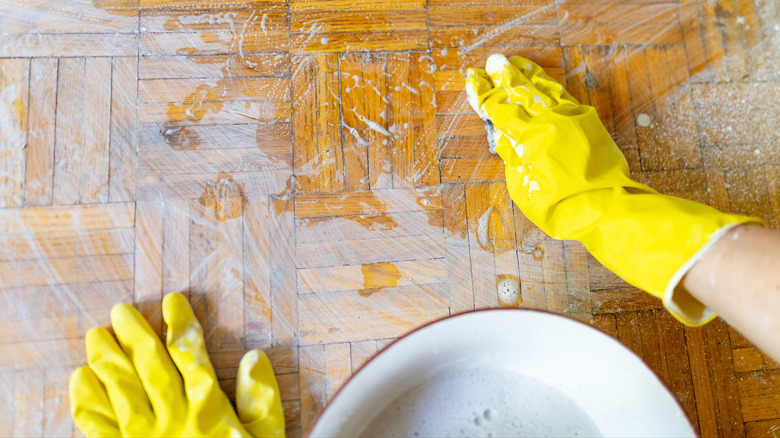How To Remove Road Salt Stains From Wood Floors
We may receive a commission on purchases made from links.
With their natural charm and durability, wood floors can transform even the most humble dwelling into a cozy haven bathed in warmth and elegance. Yet, protecting these beloved underfoot can become a slippery slope during winter. Picture this: It's been snowing outside, and road salt generously sprinkled on driveways, sidewalks, and parking lots ensures we safely venture out, minus the Sonja Henie impressions. Still, as we trudge back indoors, the salt remnants can cause havoc in the form of road salt stains on your precious wood floors. It's not quite the winter wonderland you hoped for, is it? Now, you might wonder: How do you remove salt from hardwood floors? The surprisingly simple answer is tucked right within the abyss of our pantry. When used correctly, the power duo of white vinegar and warm water can help banish those pesky road salt stains into oblivion.
While the vinegar solution has stood the test of time as a perennial favorite in cleaning tips, the one-size-tip-fits-all hardly exists in wood-floor narratives. Enter baking soda and mild soap. But again, a pinch of experimentation can let you arrive at a cleaning formula that best suits your needs while respecting the integrity of your flooring. And when it comes to scrubbing, less is more. Ultimately, striking that delicate balance between efficient stain removal and gentle affection for your wood floors will have them gleaming like freshly fallen snow.
Using vinegar to eliminate road salt stains
Kick off the fight against winter's pesky calling card (road salt stains on your wood floors) by gathering the appropriate arsenal: warm water, white vinegar, a microfiber cloth, a standard dry cloth, and a handy spray bottle. Should salt residues be strutting on your floor, a vacuum cleaner could be a powerful sidekick. But does vinegar remove salt deposits? Indeed, thanks to its acidity.
Begin your wood floor cleaning campaign by vacuuming up any visible salt residue. Now for the secret sauce — concoct 1 gallon of warm water and ⅓ cup of distilled white vinegar. Fill a spray bottle with this magical potion and, with the finesse of a seasoned bartender, spritz it over that ugly salt stain. But remember, wood planks detest swimming, particularly in vinegar-infused waters. So keep things light. The clean-up climax is a two-act performance: Soak and scrub. Let the vinegar solution do the heavy lifting for about five minutes, then channel your inner cleaning maestro and gently work the damp microfiber cloth over the once formidable stain. All that's left is the grand finale: dry your floors with a clean, dry cloth. Your battle with road salt stains should now be a toast-worthy victory story, echoing in the pleasant gleam of your salt-free floors.
Precautions to consider
Although this technique works well, moderation is critical, as too much water or white vinegar on hardwood floors can cause discoloration and swelling as haunting as road salt stains. Also, channeling your frustration into rigorous scrubbing might be cathartic, but for the love of wood, restraint is a virtue here. After all, your intention is not to banish the floor's finish along with the road salt stains.
Prevention, as often, remains our ending note. A simple act of fervently shaking off snow and salt from your shoes before entering the house, or even removing your shoes, can halt the pesky salt at the borders. In addition, coarse, heavy rugs at the entrances act as a further blockade, wrestling with icy intruders so your floors don't have to. Complete your domestic defense against road salt stains with regular vacuuming. You may also want to invest in a specially formulated cleaning product like the Bona Hardwood Floor Cleaner Spray from Amazon. We know you're eager to remove the road salt stain, but don't let your enthusiasm stain your judgment (pun absolutely intended). So, always test any cleaning product on a small, unassuming corner of your floor.


